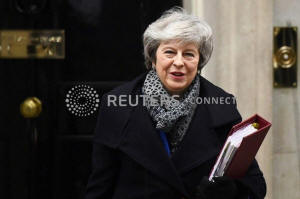|
Search on for Brexit consensus after
May's crushing defeat
 Send a link to a friend
Send a link to a friend
 [January 16, 2019]
By Andrew MacAskill [January 16, 2019]
By Andrew MacAskill
LONDON (Reuters) - Prime Minister Theresa
May on Wednesday will try to forge consensus in parliament on a Brexit
divorce agreement after the crushing defeat of her own deal left
Britain's exit from the European Union in disarray 10 weeks before it is
due to leave.
The day after her parliamentary loss by the worst margin for a British
government in modern times, May was widely expected to hold on to power
through a confidence vote, having secured the backing of her own party's
rebels and its Northern Irish allies.
The confidence motion, called by opposition Labour Party leader Jeremy
Corbyn after lawmakers rejected May's Brexit deal by 432-202, will be
held at 1900 GMT.
With the clock ticking down to March 29, the date set in law for Brexit,
the United Kingdom is now in the deepest political crisis in half a
century as it grapples with how, or even whether, to exit the European
project it joined in 1973.
After lawmakers in the 800-year-old parliament dismissed May's deal, she
pledged to speak to senior parliamentarians to find a compromise that
would avoid a disorderly no-deal Brexit or another referendum on
membership.

"The prime minister, having got through today, assuming that she does,
will then be seeking to talk to senior parliamentarians," House of
Commons leader Andrea Leadsom said.
May, an initial opponent of Brexit who won the top job in the political
turmoil that followed the referendum vote, will speak to the opposition
Labour party, the Northern Irish DUP and her own lawmakers.
Labour's finance minister-in-waiting, John McDonnell, said May could
eventually get a deal through parliament if she negotiated a compromise
with his party.
Labour says its aim is to win power and negotiate Brexit on better
terms. However, many Labour members want to see another referendum with
an option to cancel Brexit, and the party says it is ruling out nothing
if it fails to bring May down.
May's humiliating loss appears to catastrophically undermine her
two-year strategy of forging an amicable divorce with close ties to the
EU after the March 29 exit.
The last time an international treaty was defeated by the British
parliament was in 1864, when an extradition treaty with Prussia was
voted down, according to the Hansard Society.
NEW DEAL?
Sterling jumped by more than a cent against the U.S. dollar on news of
May's defeat on Tuesday and was holding close to that level on
Wednesday. Despite the failure of May's deal, many investors see the
prospect of exiting with no deal at all receding as parliament hardens
its stance against it.
May says cancelling Brexit is likelier than leaving with no deal, but
she has repeatedly stressed her determination to leave and described any
failure to carry out the mandate of the 2016 referendum as
"catastrophic" for democracy.
[to top of second column]
|

Britain's Prime Minister Theresa May leaves Downing Street, as she
faces a no confidence vote after Parliament rejected her Brexit
deal, in London, Britain, January 16, 2019. REUTERS/Clodagh Kilcoyne

Ever since Britain voted by 52-48 percent to leave the EU in a
referendum in June 2016, the political class has been debating how
to leave the European project forged by France and Germany after the
devastation of World War Two.
As the politicians discussed Brexit, companies were bracing for the
possible chaos of a no-deal Brexit that would see trade with the EU
switch to World Trade Organization rules. Many companies say this
could disrupt supply chains built to rely on friction-free trade.
UBS Wealth Management told investors to limit their exposure to UK
assets.
Other members of the EU, which combined has about six times the
economic might of the United Kingdom, called for discussion but
indicated there was little chance of fundamental change to the deal
May had negotiated. Germany's Foreign Minister Heiko Maas said there
was not much time left to find a Brexit solution and that "the time
for playing games is now over".
NO BREXIT?
EU Commission President Jean-Claude Juncker said a disorderly Brexit
was more likely while Donald Tusk, the chairman of EU leaders,
suggested Britain should now consider reversing Brexit altogether.
Brexit campaigner Nigel Farage said Britain was probably heading for
a delay and a another vote on EU membership.
"I think and I fear that we are headed on a path towards delay and
probably, yes, a second vote," Farage said.
For the EU, already reeling from successive crises over debt and
refugees, Brexit is possibly the biggest blow yet in its 60-year
history, though its 27 other members have shown remarkable unity
over Britain's exit.

While some EU leaders and many British lawmakers have suggested that
Britain might want to change its mind, Britain's leaders are
concerned that to stop Brexit could alienate the 17.4 million people
who voted to leave.
Brexiteers anticipate some short-term economic pain but say Britain
will then thrive if cut loose from what they cast as a doomed
experiment in German-dominated unity. Opponents of Brexit say it is
folly that will weaken the West, make Britain poorer and torpedo
what remains of its post-imperial clout.
(Writing by Guy Faulconbridge; Editing by Andrew Cawthorne and Peter
Graff)
[© 2019 Thomson Reuters. All rights
reserved.]
Copyright 2019 Reuters. All rights reserved. This material may not be published,
broadcast, rewritten or redistributed.
Thompson Reuters is solely responsible for this content. |